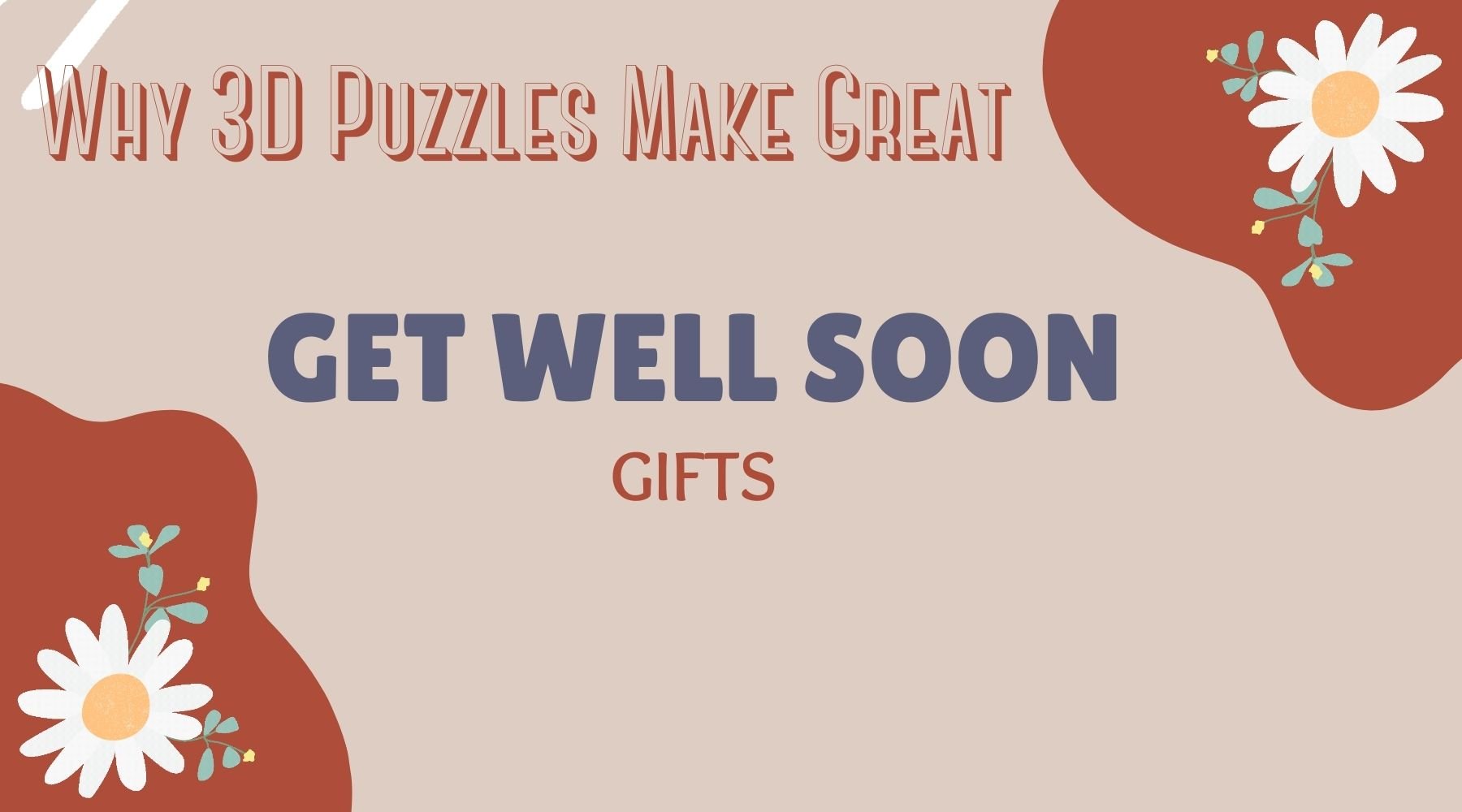When someone you love is feeling unwell, a thoughtful gift can cheer them up, and give them something to pass the time, while instantly making them feel a little perkier. It makes a big difference to a person’s recovery. It could be someone who’s suddenly fallen ill, or perhaps they’re expecting to be bedbound for a short period following an operation. When a person can’t do the things they normally could because of poor health, 3D puzzles can give them a pastime to do while sitting at a table, keep them motivated, put a smile on their face, and quite possibly, create precious shared memories together. Those are just some of the benefits of 3D puzzles. For the body and the brain, 3D puzzles do a lot and without much effort.
6 Reasons 3D Puzzles Make Great Get-Well-Soon Gifts
-
Improvements to multiple cognitive abilities

A study by Frontiers in Aging into the neuroscience of puzzling discovered multiple benefits to cognitive abilities using just 2D jigsaw puzzling, including visual perception, constructional praxis, mental rotation, visual scanning, cognitive speed and flexibility as well as perceptual reasoning. Keep in mind this involved the 2D (flat) jigsaw puzzles. When you add another dimension to the puzzle, it becomes even more mentally demanding. When you’re feeling under the weather, the best type of get-well-soon gift will be something to occupy the mind and provide mental stimulation. 3D puzzles bring multiple cognitive benefits and provide the all-important fun and entertainment factor.
-
It demands more concentration than a standard jigsaw puzzle

When you’re feeling unwell, you’ll know the joy of distraction. Many of the go-to choices are unwise. Binging on TV, unhealthy snacks, and generally feeling sorry for ourselves. By taking up some sort of hobby that keeps the hands and mind active, you’re forced to focus on what’s in front of you. For many, a standard jigsaw puzzle doesn’t have sufficient fun and entertainment value to keep us focused. It’s flat pieces that once completed, can either be glued and framed, or dismantled and put back in the box. 3D puzzles are far more immersive and require a lot more focus and concentration. As the puzzle comes together, it feels more rewarding. Regardless of whether you’re using a 3D mechanical wooden puzzle, a 3D jigsaw puzzle, or building a 3D diorama in the form of a book nook kit, the extra dimension demands an increase level of concentration.
-
Helps develop a Positive Mental Attitude

With a 3D puzzle, you’re required to think outside the box. It can be as straightforward as following the instructions, however, at each step, the mind is forced to visualize the concept. Visualization, in terms of 3D thinking, means analyzing how each tiny part of a miniature puzzle fits into the bigger picture. The more you do these, the more you’ll begin to think about things similarly – 3-dimensional thinking - Observing the small things in life that seem to be drastic, that when viewed in the concept of the grand scheme of things, may be irrelevant. When someone is feeling down due to ill health, a positive mental attitude is essential. Johns Hopkins Medicine discovered that even among those with a family history of heart disease, as many as one-third were less likely to have similar health problems just by the power of positive thinking. Once a book nook kit is assembled and illuminated, when you peek inside, there’s a feeling of euphoria – the satisfaction of knowing you created the scene. For puzzles assembled together with loved ones, that’s also a powerful piece of memorabilia that brings additional benefits from meaningful memories.
-
It’s a fine motor skills exercise

Anyone who has done standard jigsaw puzzles knows the basics of starting with the sides and then filling in the rest. With three-dimensional puzzles, there are no corner pieces or borders. One has to follow the instructions or think creatively to understand where each part of the puzzle will go and how its placement will affect the outcome. Wooden 3D puzzles are used to enhance children's learning from an early age by fine-tuning motor skills. Motor skills decline as we age, which is why basic fine motor skill exercises help protect against decline. Daily activities like buttoning shirts, putting a key in the door lock, and taking coins out of a purse/wallet each rely on fine motor skills. Assembling 3D puzzles can help fine-tune motor skills because the fingers work in harmony with the hands, arms, and eyes to coordinate moving the pieces into place and attaching them. Exercise is important for health. You don’t need to be physically active to exercise. Just sitting at a table assembling a puzzle exercises fingers, hands, and arms.
-
A Powerful Stress Buster

Perhaps the most important aspect that a get-well-soon gift addresses is the stress relief factor. Gifts that provide comfort. That’s why almost always, it’s food related items that are gifted, be that a box of chocolates, tin of biscuits, or a fruit basket. Stress relief from comfort eating is short-lived. Achieving the same outcome with a 3D puzzle provides hours of stress relief and entertainment, engagement, and fun.
-
A good social activity for family time

Socialization is an important part of a healthy lifestyle. 3D puzzles can be a group activity. Children can participate with parents, and miniature designs like book nook kits for adults or beginners that are designed to fit on a bookshelf, are portable enough to bring into care facilities to use as an activity with aging relatives like grandparents. 3D puzzles are an intergenerational activity that youths and seniors can enjoy together. Many a care home and assisted living facilities have recreation rooms and encourage residents to participate in recreational activities, because it's known to reduce depression, anxiety, and agitation, helps to foster independence, and combat feelings of isolation.




Share:
Miniature Library Kits for Bookshelf Decor
Designing with Bookshelf Inserts: The Best Locations